การจัดการขยะของเทศบาลตำบลภายใต้แนวคิดระบบเศรษฐกิจหมุนเวียน Waste Management of Subdistrict Municipality under Circular Economy Concept
Main Article Content
บทคัดย่อ
งานวิจัยนี้มีวัตถุประสงค์เพื่อศึกษาการจัดการขยะภายใต้แนวคิดระบบเศรษฐกิจหมุนเวียนของเทศบาลตำบล โดยเป็นการศึกษาเชิงคุณภาพด้วยการสัมภาษณ์แบบเจาะลึกและการสนทนากลุ่ม ใช้การวิเคราะห์ข้อมูลเชิงคุณภาพ ด้วยการวิเคราะห์เชิงบรรยายและการวิเคราะห์เชิงบริบทของเนื้อหา จากการศึกษาพบว่า ประชาชนเพียงส่วนน้อยที่มีการคัดแยกขยะในครัวเรือน อย่างไรก็ตาม องค์กรปกครองส่วนท้องถิ่นได้ส่งเสริมและมีความพยายามในการนำแนวคิดระบบเศรษฐกิจหมุนเวียนมาปรับใช้ภายใต้หลักการ 3R คือ ใช้น้อยลง ใช้ซ้ำ และนำกลับมาใช้ใหม่ ด้วยการให้ความสำคัญกับการคัดแยกขยะในครัวเรือนเพื่อนำขยะที่สามารถนำไปรีไซเคิลได้ไปขายเพื่อมีรายได้มาช่วยเป็นค่าใช้จ่ายในครัวเรือน และมีการสนับสนุนให้ชุมชนมีการจัดตั้งธนาคารขยะเพื่อเป็นสถานที่รวบรวมและรับซื้อขยะรีไซเคิลจากประชาชน ส่วนขยะ เช่น เศษอาหารมีการส่งเสริมในเรื่องปุ๋ยหมัก ปุ๋ยชีวภาพ และการนำมาหมักเพื่อผลิตก๊าซชีวภาพไว้ใช้ในครัวเรือน ส่วนการคัดแยกขยะแล้วขายในส่วนของเทศบาลเองไม่มีประสิทธิภาพมากเท่าที่ควรเพราะมีกำลังคนน้อย
Article Details
เอกสารอ้างอิง
Channawa, K. and Paileeklee, S. (2014). Solid waste management behavior of people in Tumbon Naklang Naklang distric Nong-Bua Lamphu province. Community Health Development Quarterly Khon Kaen University, 2(3), 263-271. (in Thai)
Ellen MacArthur Foundation. (2012). Towards the Circular Economy Vol. 1: an economic and business rationale for an accelerated transition. Retrieved 2019, June 12, from https://www.ellenmacarthurfoundation.org/publications/towards-the-circular-economy-vol-1-an-economic-and-business-rationale-for-an-accelerated-transition
Ellen MacArthur Foundation. (2019). City governments and their role in enabling a circular economy transition: An overview of urban policy levers. Retrieved 2019, July 23, from https://www.ellenmacarthurfoundation.org/assets/downloads/CE-in-Cities_Policy-Levers_Mar19.pdf
Ghisellini, P., Cialani, C., and Ulgiati, S., (2016). A review on circular economy: the expected transition to a balanced interplay of environmental and economic systems. Journal of Cleaner Production, 114, 11–32.
Hanphichai, S. and Janla, J. (2018). Public participation in waste management of Lamnarai municipality, Chaibadan district, Lopburi province. Suranaree Journal of Social Science, 12(1), 67-85. (in Thai)
Jongyin, T., Pukvilai, N., Ounsaneha, W. and Popradit, A. (2018). The solid waste management system of local administrative organization: A case study of Saraburi province. VRU Research and Development Journal, 13(1), 86-97. (in Thai)
Ma, Shu-hua., Wen, Zong-guo., Chen, Ji-ning., and Wen, Zhi-chao. (2014). Mode of circular economy in China's iron and steel industry: a case study in Wu’an city. Journal on Cleaner Production, 64, 505-512.
Rashid, A., Farazee M. A. Asif, Peter Krajnik, and Cornel Mihai Nicolescu. (2013). Resource conservative manufacturing. Journal on Cleaner Production, 57, 166-177.
Wang, Q. (2018). Challenges for waste legislation in the circular economy. . Retrieved 2019, July 18, from https://chemicalwatch.com/66775/challenges-for-waste-legislation-in-the-circular-economy
Wen, C. F., Zhao, Y. L., and Liang, R. Z., (2007). Recycle of low chemical potential substance. Resources, Conservation and Recycling, 51, 475-486.
Wu, Hua-qing., Shi, Y., Xia, Q. and Zhu, Wei-dong. (2014). Effectiveness of the policy of circular economy in China: a DEA-based analysis for the period of 11th five-year-plan. Resources. Conservation and Recycling, 83, 163-175.
Wuttingam, H. and Saithanoo, S. (2014). The guideline for solid waste management at household level in Paluru sub-district municipality. AL-NUR, 9(16), 121-130. (in Thai)


